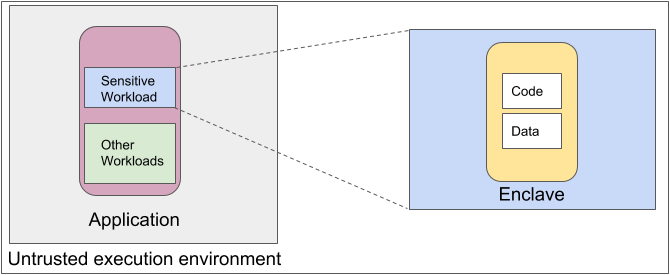Asylo Overview
Introduction
Asylo enables you to take advantage of emerging hardware and software technologies that provide trusted execution environments, known as an enclaves. Asylo provides an API, trusted and untrusted runtime libraries, and C/C++ toolchain so you can integrate your application with an enclave backend of your choice. The benefit of running your application using an enclave is that it provides confidentiality and integrity assurances for your sensitive workloads.
The main goals of Asylo are:
- Ease of use. Asylo provides ready-to-use containers, an open source API, libraries, and tools that you can use to run your application backed by an enclave technology of your choice. Ease of deployment is a focus.
- Portability across enclave backends. Once your application is adapted to the Asylo API and toolchain, you can switch to a different backend by simply re-compiling and re-packaging your application. There is no need to refactor your code because the Asylo API and toolchain are designed to work with various enclave technologies.
Architecture
Asylo allows an untrusted execution environment to host a trusted environment. The benefit is to enable sensitive workloads in an untrusted execution environment with the inherited confidentiality and integrity guarantees of the chosen trusted execution environment.
The untrusted execution environment consists of surrounding infrastructure—for instance the operating system and system libraries—and human operators that are less trusted than an enclave. The trusted execution environment consists of one or more enclaves, which protect code and data in a sensitive workload. A trusted execution environment allows an enclave to:
-
Prevent vulnerabilities outside the enclave from compromising the workloads that run in the enclave. Depending on the enclave technology, this protection may shield application code and sensitive data from one or more of the following:
- Guest virtual machine (VM) kernel or user mode vulnerabilities
- A compromised hypervisor or host operating system
-
Provide confidentiality and integrity assurances for sensitive workloads at the enclave communication boundary with its host in an untrusted environment. Confidentiality and integrity protection within an enclave is stronger than protection provided by OS-native applications.
-
Provide integrity assurances for the enclave during execution. Depending on the enclave technology, users can either remotely or locally verify the integrity of the enclave that runs their sensitive workloads.
Security backends
Asylo provides a choice of security backends:
- Software backends, such as those based on isolation provided by hardware virtualization
- Hardware backends, such as those based on proprietary CPU manufacturer implementations
Developers choose a backend that meets the security requirements for their sensitive workloads. The Asylo team has long-term design plans to protect the confidentiality and integrity of a wider range sensitive workloads and additional backends. Depending on the backend, Asylo is designed to integrate applications with enclaves that provide confidentiality and integrity guarantees against the following threats:
- Malicious or compromised administrator
- Malicious or compromised tenant of a hypervisor
- Malicious or compromised network
- Compromised operating system
- Compromised BIOS
The current release of Asylo supports a simulated enclave backend, which should not be used in production environments. Support for additional backends will be added over time to meet the varying needs and security requirements of Asylo users.
Release information
Asylo provides an API and toolchain to enable developers to develop and run applications that use one or many communicating enclaves. Asylo supports an expanding subset of POSIX, which enables running POSIX applications in an enclave with little to no source modification. Iterations of Asylo are intended to release without requiring significant change to the programming model.
The current release of Asylo is not intended for production use.
